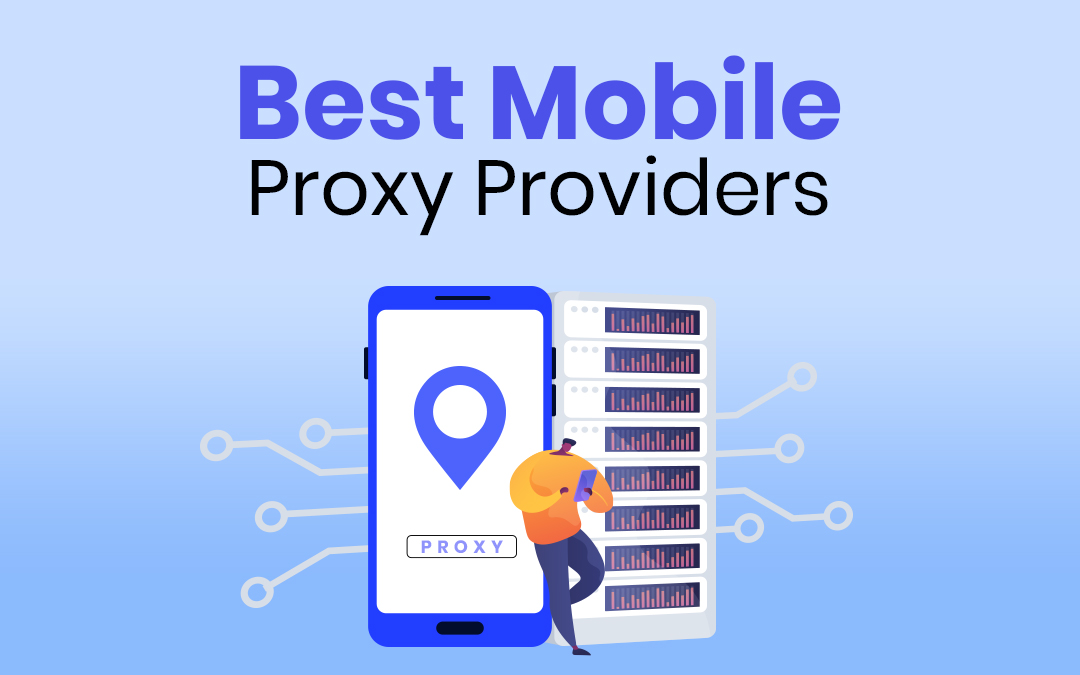
Mobile proxies are specialized internet proxies that route your traffic through mobile devices connected to cellular networks (3G, 4G, or 5G). When you use a mobile proxy, your IP address appears as if it originates from a mobile carrier, making it highly legitimate and less likely to be flagged by websites or platforms. This unique setup allows for high levels of anonymity and credibility since mobile IPs are perceived as belonging to real users. These proxies operate by assigning you a dynamic IP address, often shared among multiple users, mimicking natural user behavior.
Mobile proxies are particularly beneficial for bypassing geo-restrictions and accessing content that might otherwise be blocked. Businesses often use them for ad verification, ensuring that their advertisements are displayed correctly across different locations and devices. Additionally, they are essential for web scraping, enabling users to collect data without triggering security systems designed to detect and block bot-like activity. Mobile proxies are also effective for managing multiple accounts on platforms that restrict one account per IP, as they rotate IP addresses, reducing the risk of detection or bans.
Mobile proxy types
There are several mobile proxtypes with varying functionalities. Among the many, the following are the most common:
| Mobile proxy type | Definition | Characteristics |
|---|---|---|
| Dedicated | These proxies are exclusively assigned to one user at a time, ensuring that no one else can use the same IP address. | • Greater privacy and control. • Reduced risk of IP bans due to limited shared usage. • Higher cost compared to shared proxies. |
| Rotating | These proxies automatically switch IP addresses at regular intervals or after each request. | • Reduces the likelihood of IP bans. • Provides access to a wide range of IP addresses. • Inconsistent connection due to frequent IP changes. |
| Static | These proxies provide a fixed mobile IP address for consistent use. | • Reliable for maintaining long-term sessions. • Easier to manage compared to rotating proxies. • Higher risk of IP bans if overused for sensitive tasks. |
| 4G/5G | These proxies use 4G or 5G mobile network connections to provide high-speed, dynamic IP addresses. | • Superior speed and connection reliability. • Higher IP reputation due to mobile carrier networks. • Premium cost. • Limited availability in certain regions. |
| Geo-Targeted | These proxies allow users to select specific geographic locations for their mobile IP addresses. | • Provides access to content or platforms restricted to specific regions. • Ideal for localized ad testing or compliance verification. • Costlier than non-geotargeted options. |
Best Mobile Proxy Providers to Consider in 2024
1. Smartproxy
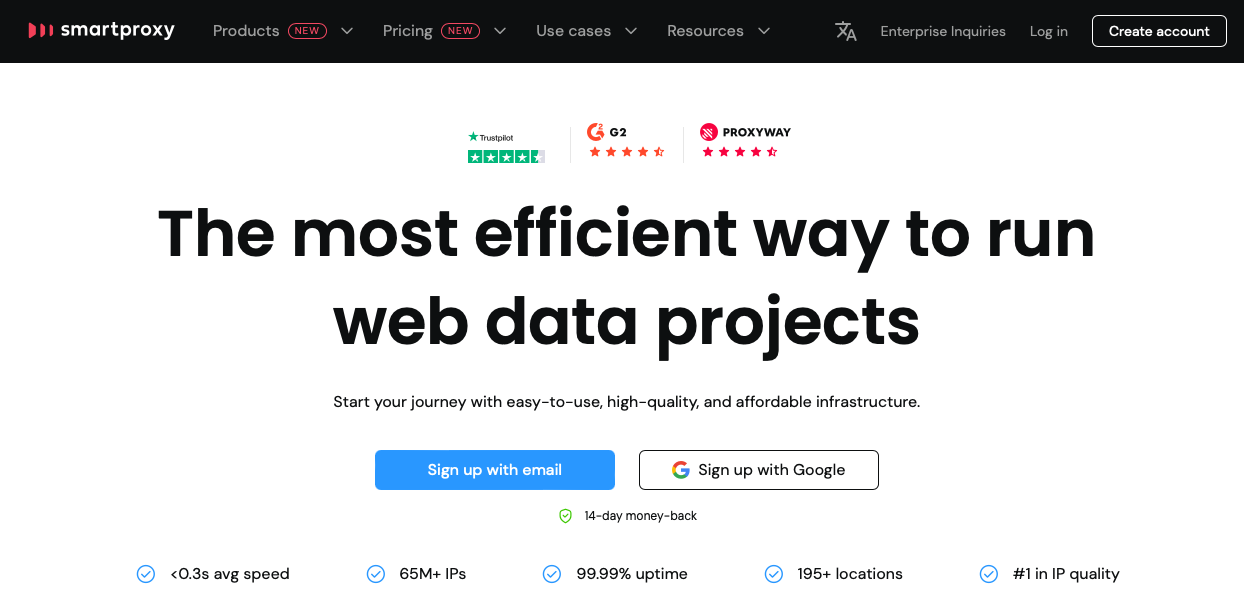
Smartproxy offers shared and mobile proxies that are easy to use and backed by great customer service. The company distinguishes itself by balancing cost and performance, making it a popular choice among developers and small businesses.
Smartproxy maintains a pool of 10M mobile proxy IPs across 160 locaations. With pricing lower than premium-oriented competitors like Oxylabs and Bright Data, Smartproxy remains competitive among the top mobile proxy providers.
The service is available under two pricing models: pay-per-GB and pay-per-IP. The dedicated plans feature unlimited traffic and unrestricted access to all domains without extra charges or hidden fees. You face no target limits and can establish unlimited parallel connections. Proxies rotate with each connection request but can be configured for 30-minute sticky sessions.
Smartproxy's dashboard allows you to choose between sequential or non-sequential IPs and select either SOCKS5 or HTTP(S) protocols. You can refresh your entire IP list or retain the same IPs upon subscription renewal.
Smartproxy delivers good value by providing high-performance proxies at affordable prices, albeit with fewer bells and whistles than the premium segment.
2. Webshare
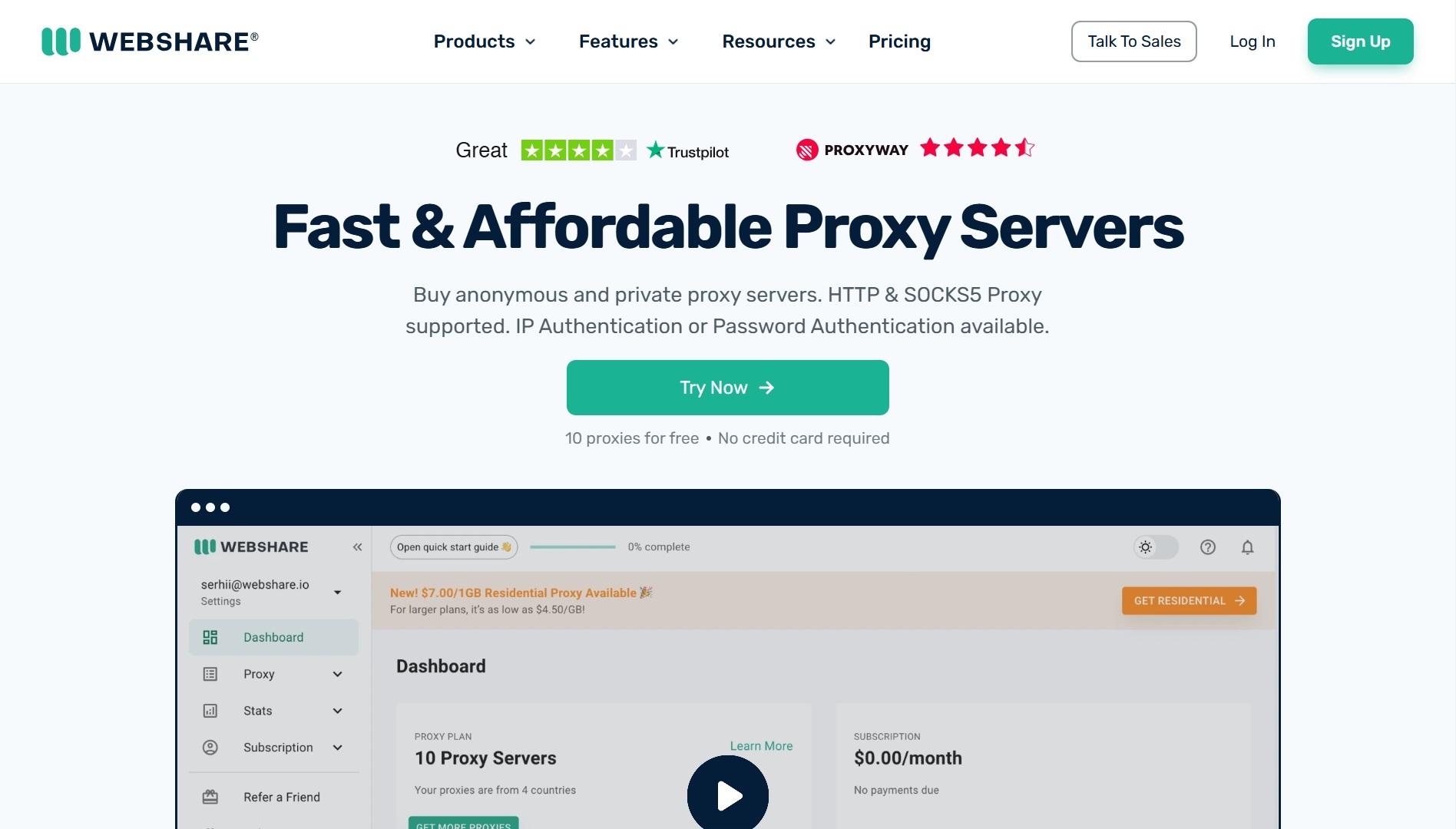
Known for its flexibility, Webshare provides highly customizable self-service options, allowing you to personalize proxy plans. You can select the number of proxies, set bandwidth limits, and adjust the number of threads. Additionally, you can choose the geolocation of your IPs and get IP refresh intervals ranging from five minutes to one month. The user-friendly dashboard ensures that even first-time users can easily navigate the platform.
Webshare offers over 30M IPs. The service supports HTTP and SOCKS5 protocols and provides IP coverage in over 50 countries worldwide.
Webshare has a free plan with 10 static IP addresses from four locations. You receive 1 GB of free data monthly and can run up to 50 concurrent threads. Your free proxy list becomes available automatically upon registration.
Aimed primarily at entry-level and mid-tier users, Webshare offers affordable pricing. For example, customer support is limited to email communication, as no live chat option is available.
3. Oxylabs
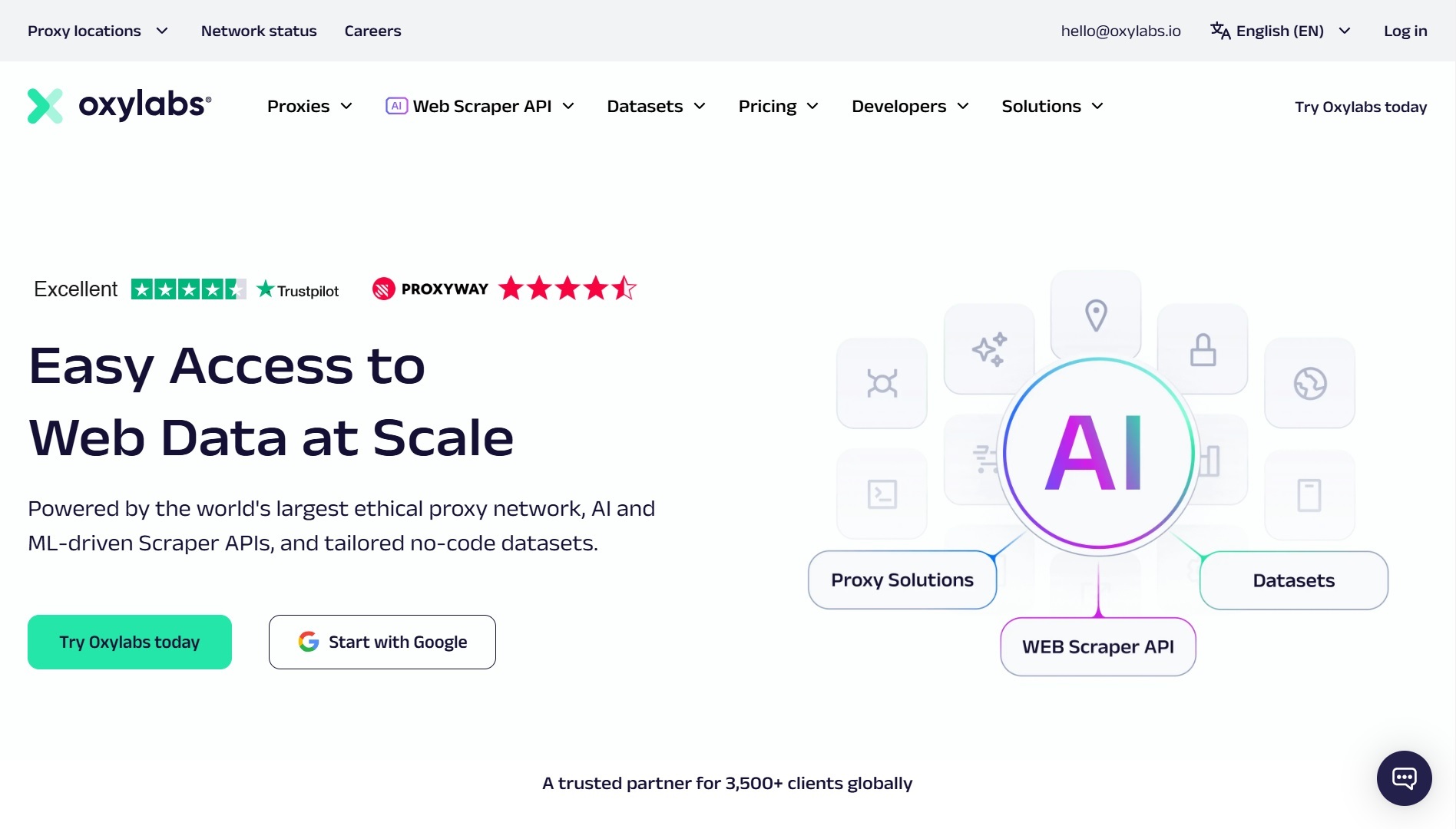
Oxylabs operates the market's largest mobile proxy server network, featuring over 20 million IP addresses. IPs are available in 140 countries, and you can target specific cities. Their primary focus is on performance, delivering rapid average response times. As such, the risks of encountering ASN and subnet-related restrictions are greatly reduced.
Oxylabs primarily targets businesses offering a premium range of proxy solutions, including dedicated and shared datacenter proxies. While their datacenter proxies may be costly for individual or general use, they don’t really have any compromises.
Oxylabs' shared datacenter proxies comprise 22,000 IPs across 9 locations, including the U.S. and several European and Asian countries. You can rotate these proxies with each connection or establish sticky sessions for a desired duration.
Oxylabs provides a functional dashboard for self-service purchases and shared and dedicated IP monitoring. As a premium provider, Oxylabs can fine-tune the proxies based on your targets and requirements, including pay-per-IP and per-traffic options. You also receive an account manager and access to an IP replacement API. Lastly, their proxies have unlimited traffic, domains, connections, connection requests, and 24/7 live support.
4. Nodemaven
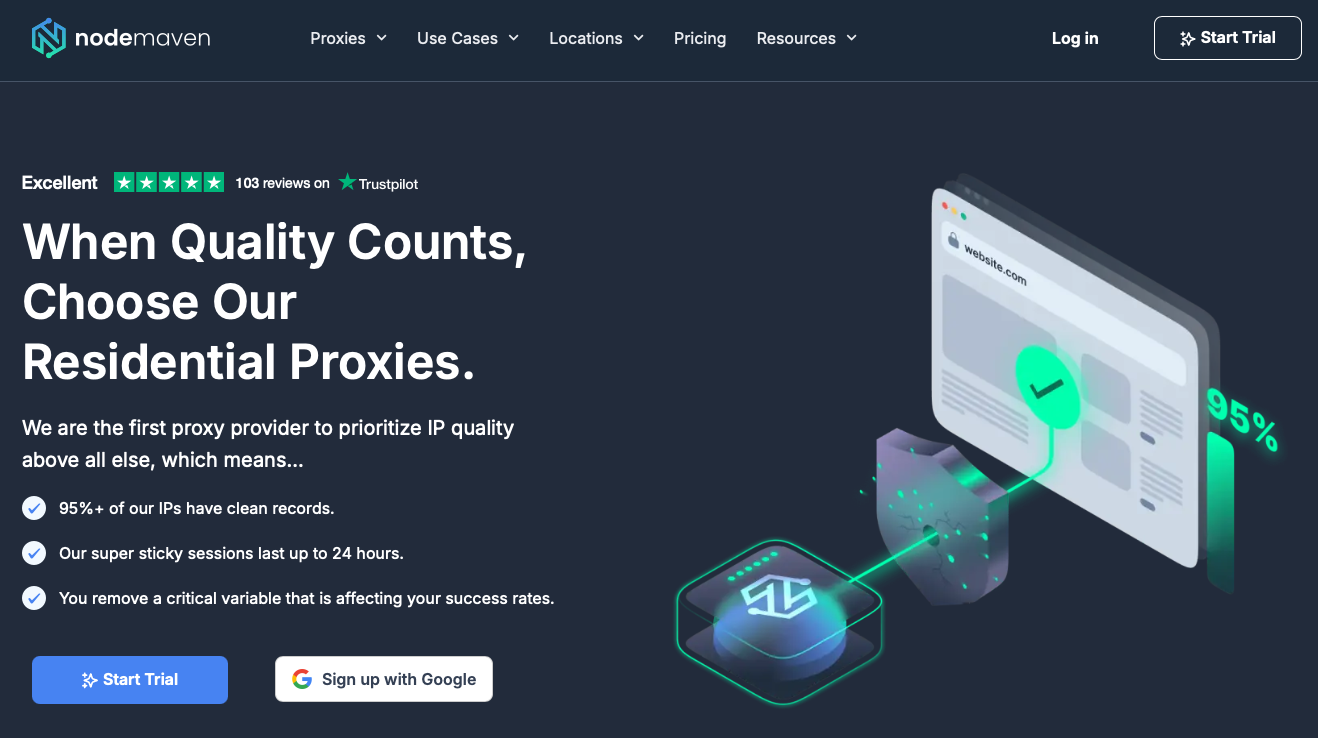
NodeMaven mobile proxies deliver high-speed, undetectable connections for businesses and individuals needing automation, web scraping, and multi-account management. With access to 295K+ real mobile IPs, our proxies bypass geo-restrictions, avoid bans, and ensure high success rates for even the most challenging platforms. NodeMaven’s mobile proxies are ideal for use cases such as ad verification, social media automation, and competitive intelligence.
Nodemaven offers a robust mobile proxy network with an extensive pool of 295K premium mobile IPs, ensuring seamless and secure browsing. Designed for maximum reliability, Nodemaven delivers an impressive 99.99% proxy stability uptime, minimizing downtime and disruptions for users who require uninterrupted access. Leveraging 5G, 4G, and LTE mobile proxies, it provides high-speed connectivity, making it an ideal choice for web scraping, social media management, sneaker copping, and other automation tasks that demand fast and undetectable mobile IP rotations. With Nodemaven, users can experience superior performance, enhanced anonymity, and stable connections across multiple devices and regions.
5. Simplynode
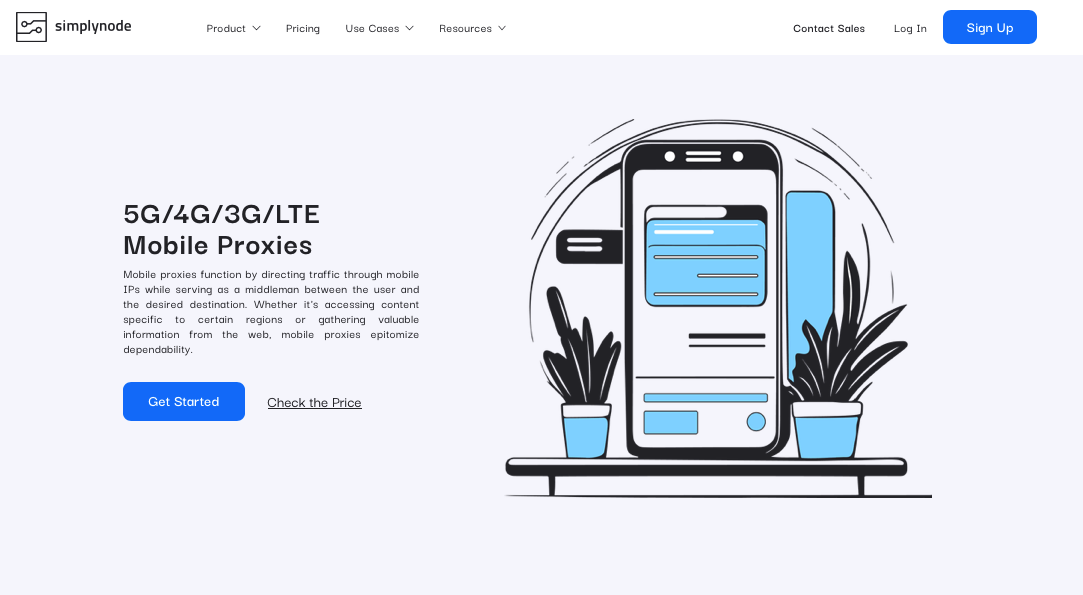
SimplyNode is a trusted provider of high-quality proxy solutions, offering access to over 50 million ethically sourced IPs across 180+ countries. With a vast network of residential and mobile proxies, SimplyNode enables country- and city-level targeting, allowing users to refine their proxy selection with pinpoint accuracy. SimplyNode ensures secure and efficient connections for tasks such as web scraping, ad verification, and SERP analysis.
Supporting HTTP(S), SOCKS, and UDP protocols, SimplyNode delivers secure, high-performance connections. With a 99.3% success rate, users benefit from unmatched reliability and seamless access to global data.
SimplyNode offers a flexible, pay-as-you-go pricing model with tiered rates. With no expiration on purchased gigabytes, users can consume data at their own pace without worrying about losing unused traffic. Combined with 24/7 live support, SimplyNode provides expert assistance whenever needed, making it the ideal choice for businesses and individuals seeking global coverage, advanced targeting, and top-tier proxy performance.
6. Proxy-Sale
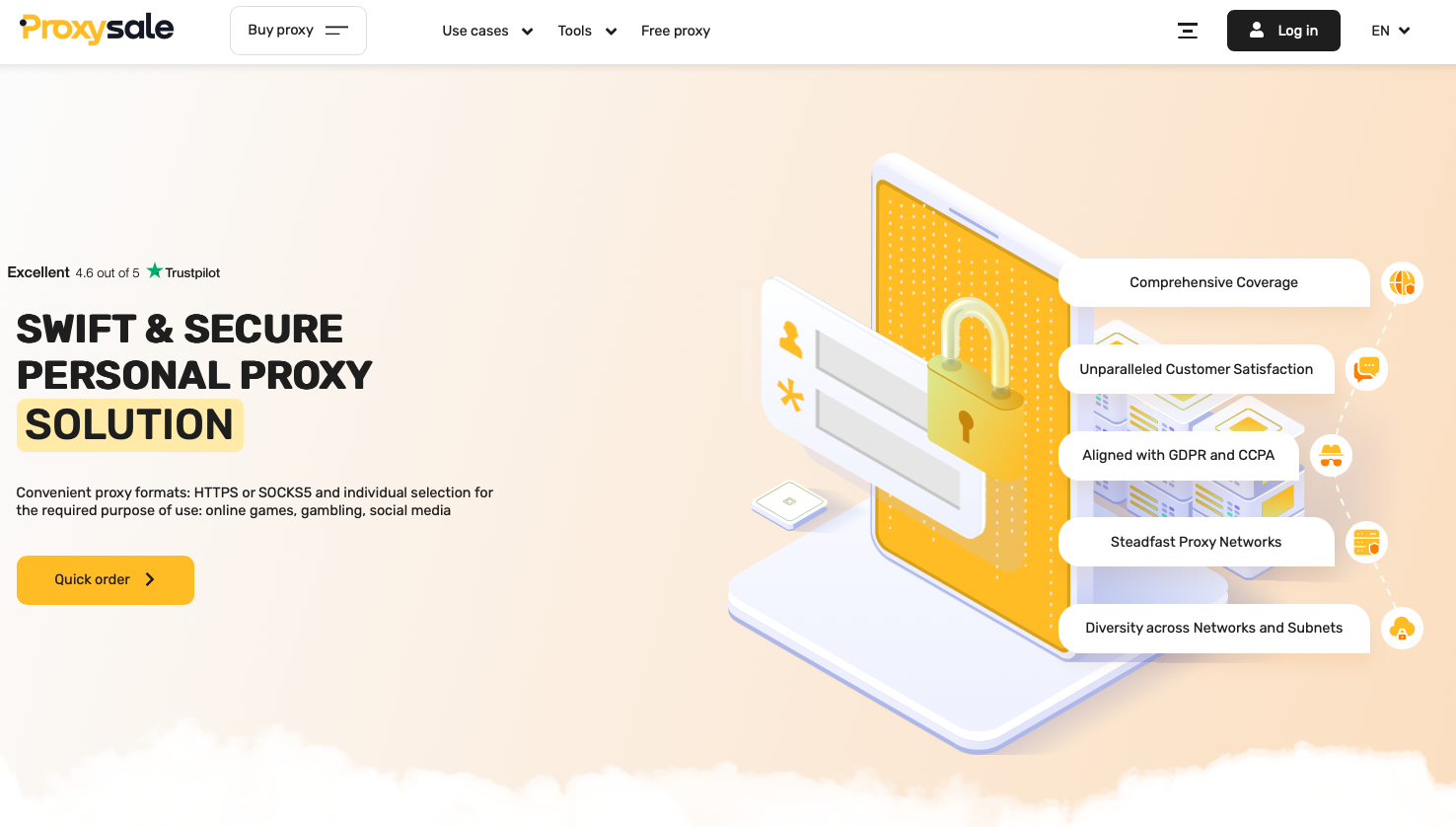
Proxy-Sale is a reputable provider of mobile proxies, offering private 5G, 4G, and LTE proxies with dynamic IP addresses sourced from real GSM operators. These proxies are ideal for tasks such as parsing search engine results, anonymous web surfing, account registration, and accessing various messengers. With support for HTTP(S) and SOCKS5 protocols, users can seamlessly integrate these proxies into their workflows.
Users benefit from unlimited traffic and high-speed connections, thanks to 4G/5G/LTE networks. IP rotation can be customized based on timing or via a provided link, ensuring flexibility and control over sessions. The proxies are dedicated to individual users, enhancing security and reducing the risk of IP bans.
Proxy-Sale offers competitive pricing and 24/7 customer support to assist with setup and troubleshooting. Their mobile proxies are particularly beneficial for SMM specialists, arbitrage professionals, marketers, testers, registrars, and PPC marketers, providing a reliable and secure solution for various online activities.
7. YouProxy
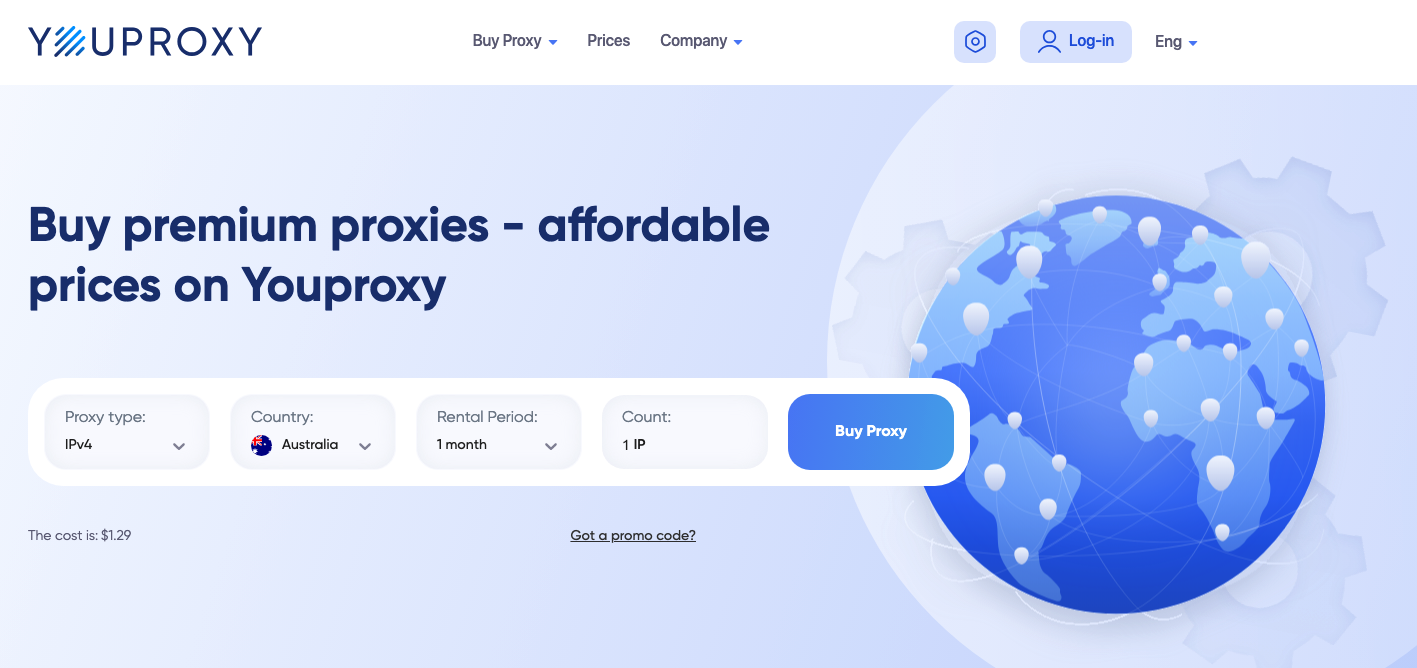
YouProxy, established in 2017, offers dynamic mobile proxies utilizing 3G, 4G, and 5G connections to ensure seamless browsing without blocks or CAPTCHA challenges. Their IP addresses provide maximum anonymity and security. With support for HTTPS and SOCKS5 protocols, YouProxy's infrastructure is optimized for high loads, enabling efficient execution of complex tasks. Clients benefit from flexible IP rotation options—per request or at intervals of 5, 10, or 30 minutes—across a vast pool of IP addresses in over 12 countries, including the USA, England, India and various European nations. This flexibility makes YouProxy ideal for activities such as social media management, web scraping, and bypassing geo-restrictions. The service boasts 100% anonymity, 99% uptime and 24/7 customer support.
The pricing model of mobile proxies
The pricing of mobile proxies depends on several factors, including their type, provider, and intended use case. Here’s an overview of how mobile proxies are typically priced:
| Pricing Model | Characteristics |
|---|---|
| Pay-As-You-Go |
|
| Subscription-Based |
|
| Per Proxy |
|
Conclusion
Mobile proxies offer a unique and powerful solution for achieving secure, anonymous, and efficient internet activity. Their ability to route traffic through real mobile networks gives them a high trust score, making them ideal for bypassing geo-restrictions, managing multiple accounts, and conducting large-scale data operations like web scraping or ad verification. By mimicking natural user behavior, they reduce the likelihood of detection or bans, providing a reliable tool for businesses and individuals alike.
Share this post
Leave a comment
All comments are moderated. Spammy and bot submitted comments are deleted. Please submit the comments that are helpful to others, and we'll approve your comments. A comment that includes outbound link will only be approved if the content is relevant to the topic, and has some value to our readers.

Comments (0)
No comment